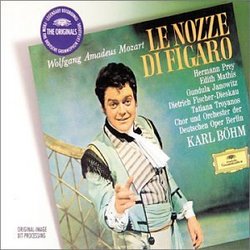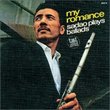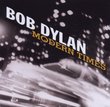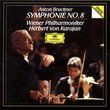| All Artists: Dietrich Fischer-Dieskau, Klaus Hirte, Gundula Janowitz, Patricia Johnson, Peter Lagger, Chor und Orchester des Deutschen Oper Berlin, Tatiana Troyanos Title: Mozart: Le Nozze Di Figaro Members Wishing: 0 Total Copies: 1 Label: Deutsche Grammophon Release Date: 3/11/1997 Album Type: Box set Genre: Classical Styles: Opera & Classical Vocal, Historical Periods, Classical (c.1770-1830) Number of Discs: 3 SwapaCD Credits: 3 UPC: 028944972825 |
Search - Dietrich Fischer-Dieskau, Klaus Hirte, Gundula Janowitz :: Mozart: Le Nozze Di Figaro
 | Dietrich Fischer-Dieskau, Klaus Hirte, Gundula Janowitz Mozart: Le Nozze Di Figaro Genre: Classical
![header=[] body=[This CD is available to be requested as disc only.]](/images/attributes/disc.png?v=430e6b0a) ![header=[] body=[This CD is unavailable to be requested with the disc and back insert at this time.]](/images/attributes/greyed_disc_back.png?v=430e6b0a) ![header=[] body=[This CD is unavailable to be requested with the disc and front insert at this time.]](/images/attributes/greyed_disc_front.png?v=430e6b0a) ![header=[] body=[This CD is unavailable to be requested with the disc, front and back inserts at this time.]](/images/attributes/greyed_disc_front_back.png?v=430e6b0a) |
Larger Image |
CD DetailsSimilar CDs
Similarly Requested CDs
|
CD ReviewsThe Figaro that turned me on to Opera vladb | Brighton, MA USA | 09/11/2003 (5 out of 5 stars) "Like many newcomers to the Opera genre, after hearing "Sull'aria" in the film "Shawshank Redemption", I patiently watched the credits to find the exact origin of that unearthly recording - and found it to be 1968 Bohm's version. Without much hesitation, I bought this set, almost immediately afterwards, and listened to the whole 3 hours of it non-stop for several months. "Figaro" became, bar none, my ultimate favorite classical composition, all thanks to Bohm.To this day, I find no imperfections whatsoever with the performers or the conducting. It baffles me why anyone would find fault with Mathis' Susanna or Dieskau's Conte - they fit their roles to a tee. And the "extra" arias in act IV, in my mind are welcome additions, especially that of Marcellina, which is not only exquisitely beautiful, but also a thematic counterpart of Figaro's later diatribe about the opposite sex. Hermann Prey, Gundula Janowitz, and Tatiana Troyanos, are the living embodiments of Figaro, Contessa, and Cherubino. Never has Mozart's accent on the humanity of these characters been better expressed." Not the best but you've got to hear it. Casey Ellis | Mohegan Lake, New York United States | 04/28/2002 (4 out of 5 stars) "If anyone is interested, this set holds ALOT of memories for me. It was the first complete opera set I ever really listened to constantly and so it has a special place in my heart. That being said, it is no longer my favorite "Figaro". That title must go to John Eliot Gardiner's amazing set on Archiv. I strongly urge anyone who wants to understand this opera to purchase that performance. But this set still has much to commend it. Bohm coaxes certain phrases like no one else. The letter duet is a fine example. Enjoy it because you are unlikley to hear it with so much color, lushness and passion again soon. Unfortunately, Bohm often misses the fun and zip in the score. Things tend to be a tad weighted down and the comedy fails to register. Surprisingly the overture does not get treated this way and is a joy. The cast is great but there are some glarring problems. First of all, few of them are very at home with Italian. True this piece is not "Italian" in terms of style but that is the language and this cast's problems with it is a distraction. Prey and Mathis are an old-fashioned Figaro and Susanna which means big, cuddly guy and china doll. While I feel there is more to these characters, this approach can be heart-warming to listen to. Prey is in glorious voice, warm and sunny and the liner notes are right to refer to a "smile in the voice". Mathis is a bit thin in arias but sounds much more at home in the ensembles. And Fischer-Dieskau? Haha! What an artist! His voice is at full power and he pours his interpertation into each note. This Count is a raging psychopath burning with lust! Most lines are snarled out in a way that chills the blood. A contrast with Gilfry's controlled aristocrat on the Gardiner set is fascinating. I like Gilfry better but Dieskau certainly left his stamp on the part and creates just as valid a character. Janowitz IS the Countess. I've heard enough by now to say that. She achieves total identification with the character. All others I have heard and seen (so far) are either blank slates (the bad ones) or get a part of Janowitz's whole (the good ones). I know plenty of you will sneer at that but that's how I hear it. Janowitz has a golden line of a voice that stretches through the entire score. You think "Sooner or later there will be a sign of strain or wear and tear" but it never comes. The voice is lyrical but with strength underneath it. It is simply pure. Someone who I usually disagree with on vocal matters said upon hearing it "That's just a perfect voice." Dramitically we get the Countess's fear, anger, flirtatiousness, love, regret, nobility and simplicity. Nothing is missing. We should all feel lucky that this definitive performance was captured whole in such a fine recording. The supporting cast is fairly strong. Troyanos is lovely and funny as Cherubino although Bohm does not seem too interested in the character. Lagger and Johnson are in good voice and act well but they don't sound like they are having much fun. In contrast, Wohlfahrt and Hirte have ok voices but do a super job of hamming up their parts. It's great to hear Wohlfahrt, a fine singer in such a rich part. Vogel is cute and matches Troyanos well. Vantin has a very nice voice and sings his heart out in the "Mia Madre" sextet but (once again!) he doesn't sound very funny. The two girls are fine. One last complaint: the recitatives are not done well by today's standards. The cast and Bohm seem to regard them as something to get through fast. Prey, Dieskau and Janowitz are exceptions to this however. Chorus and orchestra are both super. Sound is boxy but clear. Great liner notes. Perhaps the only real problem with this set is a lack of fun. Bohm sees this opera as deeply profound. It most certainly is but part of it's profundity lies in it's sense of joy. This aspect is muted (although not lost) here. The "Mia Madre" sextet is a good example. In this set it played as deeply moving (which it is) but there are not really any laughs. "Figaro" is a sublime comedy. The comedy can not be so secondary. Without it, we loose some of the point which is to see life as something of a comedy. On the other hand, if one plays down the sublime the opera becomes a simple and vulgar farce. Perhaps if you must mute one aspect, it is better to mute the comedy. But there really should be a ballance. Still, when all is said and done this is a great reccording. It preserves many top-notch performances and an entire way of viewing this deathless masterpiece. This view (usually seen as the "German" view) may be out of favor, but it touched many people and served Mozart well. Indeed, it can still speak to us today if we are willing to be patient. Don't make this your only "Figaro" but don't be without it if you love this opera." Stunning Karen From | Illinois | 08/11/2001 (5 out of 5 stars) "I first heard of this music from the film, The Shawshank Redemption. I immediately set out to find out what it was and where I could get my hands on it. After a lengthy search, I finally found it. To me, the Sull'Aria offered by Gundular Janowitz and Edith Mathis has to be THE most beautiful piece of music I have ever heard. Not only would I not hesitate to recommend it, but I would suggest getting a second copy for when the first wears out!"
|

 Track Listings (27) - Disc #1
Track Listings (27) - Disc #1










